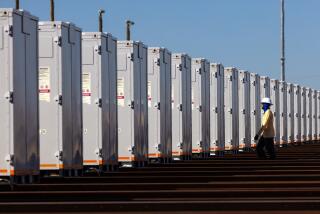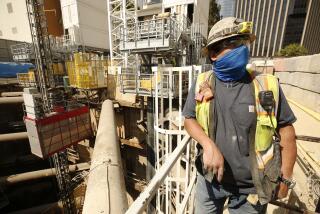Group to Seek Workers to Rebuild Gulf Coast
- Share via
NEW ORLEANS — Amid a desperate shortage of labor to rebuild the Gulf Coast after hurricanes Katrina and Rita, a business group launched an effort Friday to recruit and train as many as 20,000 new construction workers for the region.
The Business Roundtable, a Washington-based association of 160 chief executives of major companies, said it planned to recruit 2,500 workers this year, 15,000 in 2007 and 2008 and 2,500 more in 2009.
The region already had faced a shortage of construction and maintenance workers before the storms. Studies have put the post-storm shortage at as high as 150,000 workers.
About 300 trainees already are in the program, and extensive recruiting is starting in Baton Rouge, La., and Jackson, Miss. -- two areas that took in large numbers of storm refugees -- and will be expanded to other cities. Participants take a four-week course, which primarily covers basic safety, targeted at filling entry-level positions in various skilled construction and maintenance trades.
Companies participating in the Business Roundtable are committing $5 million to launch the program, which also will receive funds from the Labor Department and national emergency grants. The program is being coordinated with trade schools, community colleges, storm recovery agencies, unions and trade organizations.
DuPont Co. Chief Executive Chad Holliday Jr., whose company has two plants in Mississippi, said the program could be a “role model” of public-private partnerships because, instead of being created from scratch, it uses available resources.
“We’re using the infrastructure that is there,” said Holliday, co-chairman of the project. “We think it’ll travel well by word of mouth. We get 1,000 in there and they’ll tell their buddies.”
Mike Matlock, site maintenance leader for Dow Chemical Co.’s four Louisiana facilities and a company representative on the project, said the need for construction and maintenance workers extended far beyond rebuilding hurricane-damaged buildings and infrastructure.
The current pinch on the number of workers can affect expansions and operations at chemical plants and refineries, for example, he said. A tight labor force delays projects, pushes up costs and, in some cases, drives projects to areas where more workers are available, Matlock said.
More to Read
Inside the business of entertainment
The Wide Shot brings you news, analysis and insights on everything from streaming wars to production — and what it all means for the future.
You may occasionally receive promotional content from the Los Angeles Times.










